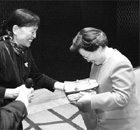Top Stories
Gender words removed from hospital names
By Yao Jing (China Daily)
Updated: 2010-04-29 07:56
 |
Large Medium Small |
Hospitals and medical institutions in Beijing will not be allowed to include words such as man, male, woman, female, or use similar obvious gender-specific vocabulary in their names from June 1, under government regulations overseeing the medical services market.
Beijing municipal health bureau said its interim set of rules, formulated last year, will be put into force at the start of June.
The regulations followed a similar initiative from the Ministry of Health, which drew up rules for medical institutions and compiled a list of acceptable hospital vocabulary.
Qiu Dalong, director of the medical affairs department within the Beijing municipal health bureau, said on Wednesday that 126 medical organizations had changed their names.
"We will supervise and urge action from organizations that are reluctant to comply with the regulation," he said.
The change of hospital names will not affect the operation of those institutions, he said.
A press officer, surnamed Bao, in the Beijing Shuguang Men's Hospital said it had deleted the word "men" from its name. It will now be known as Beijing Shuguang Hospital.
Beijing Contemporary Women's Hospital has also changed its name - into Beijing Contemporary Hospital - said a receptionist on Wednesday.
However, a consultant doctor at Beijing Wuzhou Women's Hospital said the hospital had not yet been renamed. The consultant said that sort of decision rested with senior managers.
People on the street were mixed on whether the government's move was a good one.
"I think it is a sensible decision because those words are not elegant in Chinese culture. They are often related to sexually transmitted diseases or infertility," said a man surnamed Liu.
Some hospitals with gender specific names have become well known, thanks to ads on TV or in leaflets that promote infertility services. Some of those claims were proved to be exaggerated.
However, a woman surnamed Wang told METRO that hospitals with those words gave a professional impression to people while those without the sensitive words would confuse them.
Life Times newspaper reported there are almost 500 Tongji Men's Hospitals nationwide, most of which claim they specialize in infertility and other sex-related issues, but none of them is really associated with the genuine Tongji Hospital in Wuhan, Hubei province.
A Chinese Infertility Investigation Report, released by the China Population Association, found the infertility rate is about 10 percent. It was only 3 percent 20 years ago.
Many couples who want to have babies spend a lot of money on fertility services, prompting hospitals to cater to them.







